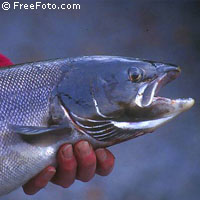EU project develops omega-3 rich crop
Genetically engineered plants which produce essential omega-3 fish oils could offer a new way of improving people's diets, scientists working on an EU project said at a conference on 'Incorporating Omega 3 in the food chain'. The Lipgene project researchers believe the plants, which would be used as feed for farm animals, could bring many benefits, including increasing omega-3 in human diets and easing pressure on dwindling fish stocks. Long-chain fatty acids called eicosapentaenoic acid (EPA), and docosahexaenoic acid (DHA), found mainly in oily fish such as salmon, mackerel and herring, provide protection against cardiovascular diseases, slow down mental decline in the elderly and are essential for the healthy development of a baby's brain in the womb. Whilst experts recommend a daily intake of 450mg of omega-3 fatty acids, most adults barely manage half that amount. Among teenagers, the figure drops to just 100mg a day, and intake in low-income families is around 50mg per day less than in other families. In order to address the health problems that could result from a lack of these essential fatty acids, the EU-funded project Lipgene has brought together scientists and economists to look for ways to increase the levels of the oils in people's diets. A study within the project found that the costs of increasing omega-3 consumption across Europe would be paid back many times over in reduced healthcare costs. One of the Lipgene scientists, Ian Givens of the University of Reading, believes the answer could lie in increasing omega-3 fish oils in popular foods. Whilst only 30% of Britons regularly eat oily fish, 80% eat poultry. Dr Givens increased the omega-3 levels in his chickens by adding the oils, taken from fish, to their feed. However, this method may not be sustainable given the depletion of fish stocks around the world. Another partner in project, Professor Johnathan Napier of Rothamsted Research Institute, UK, believes the only sustainable way to increase omega-3 in people's diets is to turn to GM technology, as there are no naturally occurring plant species that have the capacity to synthesise these long-chain omega-3 fatty acids. EPA and DHA are normally made by microscopic marine algae which are then eaten by small fish, passing the fatty acids into the food chain. Professor Napier isolated key genes from algae and inserted them into linseed and oilseed rape. He found that plants were able to synthesise omega-3 fatty acids in their seed oils. The eventual aim would be to feed the GM-enhanced plants to animals such as chicken and cattle so as to produce omega-3 enriched meat, milks and eggs. According to Professor Napier, fields of GM crops for animal feed could be grown within five years. Although the scientists admit the public's concerns about GM crops would have to be addressed, they are confident that once the benefits were made clear, mindsets would change. The Lipgene project, 'Diet, genomics and the metabolic syndrome: an integrated nutrition, agro-food, social and economic analysis', brings together over 200 scientists and involves 25 research centres from across Europe. It will run until 2009.
Countries
United Kingdom



